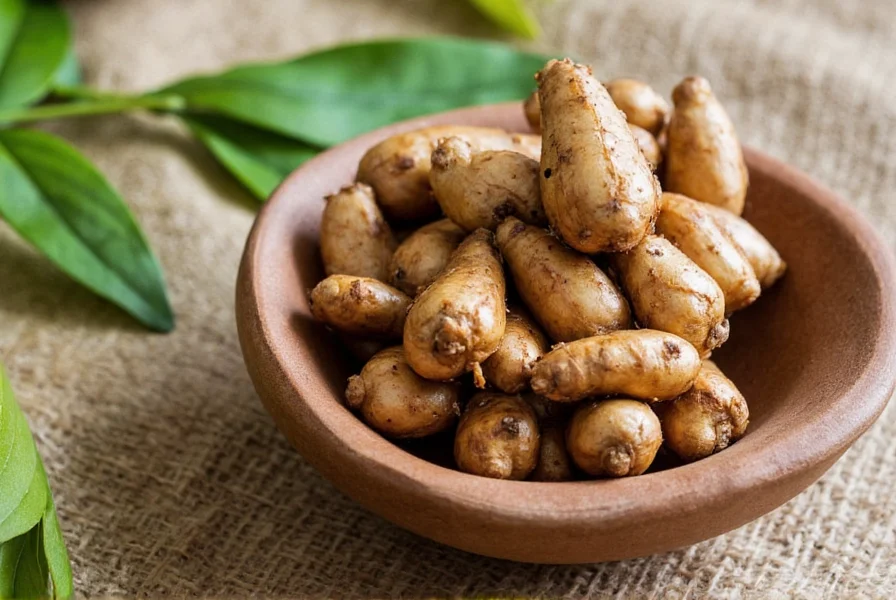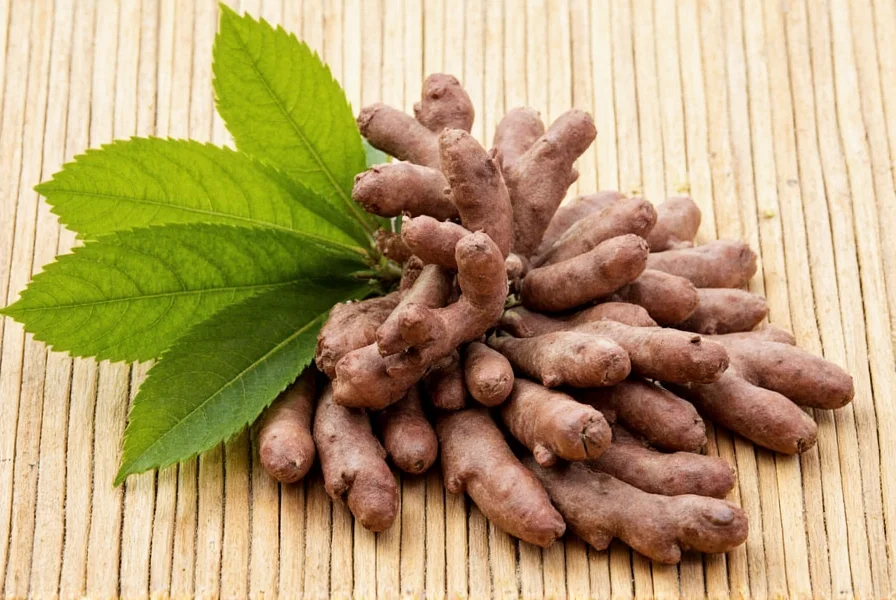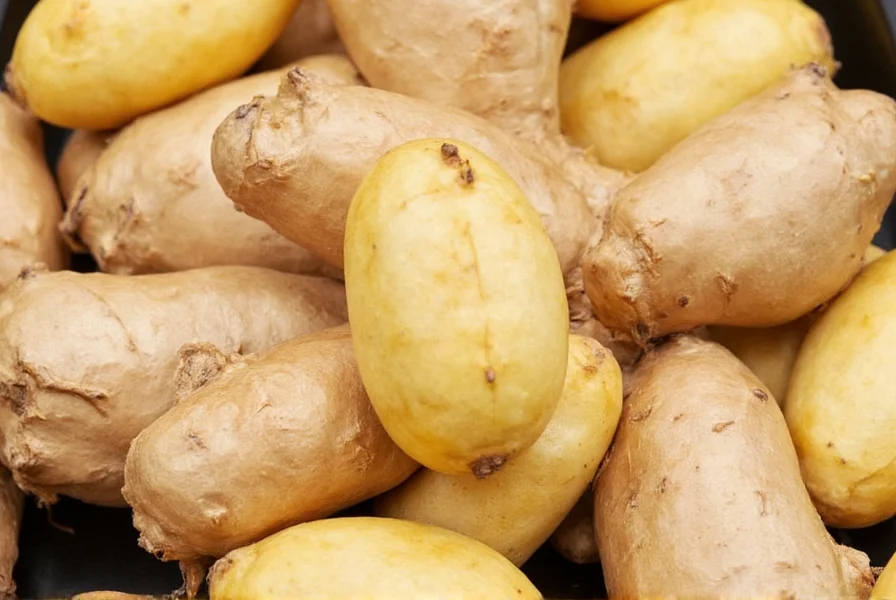For centuries, traditional medicine systems across Southeast Asia have utilized black ginger as a powerful medicinal herb. Modern research is now validating many of these traditional uses while uncovering new potential applications for this distinctive rhizome. As interest in natural health solutions grows, understanding the specific benefits of black ginger compared to its more common cousin becomes increasingly valuable.
What Exactly Is Black Ginger?
Black ginger (Kaempferia parviflora), also known as Thai ginseng or Krachai dum, belongs to the Zingiberaceae family but differs significantly from common ginger (Zingiber officinale). Native to Thailand and neighboring regions, this perennial plant features dark purple-black rhizomes that give it its distinctive name. Unlike regular ginger's pungent heat, black ginger offers a more complex flavor profile with earthy, slightly sweet notes.
The key difference lies in its unique phytochemical composition. Black ginger contains high concentrations of polymethoxyflavones (PMFs), particularly 5,7-dimethoxyflavone and 3,5,7,3',4'-pentamethoxyflavone, which are virtually absent in common ginger. These compounds are responsible for many of black ginger's distinctive black ginger health benefits that researchers are actively investigating.

Scientifically Researched Health Benefits
Unlike many herbal supplements with only anecdotal support, black ginger has attracted significant scientific attention. Let's examine the evidence behind its most promising benefits:
1. Potent Antioxidant Properties
Multiple studies confirm black ginger's exceptional antioxidant capacity. Research published in the Journal of Agricultural and Food Chemistry demonstrated that black ginger extract exhibits significantly higher antioxidant activity than common ginger—up to three times more potent in certain tests. The unique polymethoxyflavones effectively neutralize free radicals and may help protect cells from oxidative damage associated with chronic diseases.
2. Anti-Inflammatory Effects
Chronic inflammation underlies many modern health conditions. A 2020 study in Phytomedicine revealed that black ginger extract inhibits key inflammatory pathways, particularly reducing levels of TNF-α and IL-6 cytokines. This makes black ginger for inflammation a promising natural approach, potentially benefiting those with arthritis or other inflammatory conditions.
3. Metabolic Health Support
Perhaps most exciting is black ginger's potential impact on metabolic health. A randomized controlled trial with 60 participants (published in Nutrition Research) found that black ginger supplementation significantly improved markers of metabolic syndrome, including better blood sugar regulation and reduced waist circumference. The mechanism appears related to enhanced AMPK activation, a cellular pathway crucial for energy metabolism.
| Benefit Category | Key Compounds | Research Status | Potential Applications |
|---|---|---|---|
| Antioxidant | Polymethoxyflavones | Strong in vitro evidence | Cellular protection, anti-aging |
| Anti-inflammatory | 5,7-dimethoxyflavone | Animal and human studies | Arthritis, joint health |
| Metabolic Support | Various PMFs | Human clinical trials | Blood sugar regulation, weight management |
| Circulatory Health | Nitric oxide promoters | Preliminary human studies | Cardiovascular support, athletic performance |
Black Ginger vs. Regular Ginger: Understanding the Differences
While both belong to the ginger family, black ginger vs regular ginger benefits reveal significant distinctions:
- Active compounds: Black ginger contains unique polymethoxyflavones absent in common ginger
- Potency: Research suggests black ginger may be 2-3 times more potent for certain antioxidant and anti-inflammatory effects
- Metabolic impact: Black ginger shows stronger evidence for blood sugar regulation and fat metabolism
- Traditional uses: Regular ginger excels for digestive issues and nausea, while black ginger traditionally addressed vitality and circulation
- Availability: Common ginger is widely available fresh, while black ginger typically comes as supplements or extracts
How to Use Black Ginger Effectively
To experience the potential black ginger health benefits, consider these usage approaches:
Forms and Dosage
Black ginger is available as:
- Dried powder (1-3 grams daily)
- Capsules or tablets (follow product instructions, typically 250-500mg)
- Extracts or tinctures (dosage varies by concentration)
- Tea (steep 1-2 grams of dried rhizome in hot water)
Most clinical studies use standardized extracts providing 100-300mg of black ginger daily. For best results, look for products standardized to polymethoxyflavone content.
Timing Considerations
Research suggests taking black ginger before meals may optimize its metabolic benefits. Some athletes time consumption before workouts to potentially enhance circulation and performance, though more research is needed in this area.

Safety Profile and Potential Side Effects
Black ginger appears generally safe when consumed in typical dietary or supplemental amounts. However, consider these points:
- Medication interactions: May interact with blood thinners or diabetes medications due to potential effects on circulation and blood sugar
- Pregnancy: Insufficient research exists—avoid during pregnancy and breastfeeding
- Digestive effects: Some users report mild stomach upset at higher doses
- Allergies: Those allergic to ginger family plants should avoid black ginger
As with any supplement, consult your healthcare provider before starting black ginger, especially if you have existing health conditions or take medications. While black ginger side effects are typically mild, individual responses can vary.
Integrating Black Ginger Into Your Wellness Routine
For those interested in exploring how to use black ginger for health, consider these practical approaches:
- Start with a lower dose (100-200mg daily) to assess tolerance
- Choose products with third-party testing for quality assurance
- Combine with a balanced diet and regular exercise for metabolic benefits
- Be patient—many benefits may take 4-8 weeks of consistent use
- Track your experience to determine personal effectiveness
Remember that black ginger works best as part of a comprehensive health strategy rather than a standalone solution. The most promising scientific studies on black ginger show benefits when it's incorporated into an overall healthy lifestyle.
Looking Ahead: Future Research Directions
While current evidence for black ginger is promising, researchers identify several areas needing further investigation:
- Long-term human studies on metabolic health benefits
- Dose-response relationships for specific health outcomes
- Comparative effectiveness against other natural compounds
- Mechanisms of action for circulatory and cognitive benefits
- Optimal extraction methods to preserve active compounds
As more rigorous clinical trials emerge, our understanding of is black ginger better than regular ginger for specific applications will continue to evolve. For now, the existing evidence supports its potential as a valuable addition to a health-conscious lifestyle.
Frequently Asked Questions
What makes black ginger different from regular ginger?
Black ginger (Kaempferia parviflora) contains unique polymethoxyflavones like 5,7-dimethoxyflavone that are virtually absent in regular ginger. These compounds give black ginger significantly higher antioxidant capacity (up to three times more potent in some tests) and different health benefits, particularly for metabolic health and circulation. While regular ginger excels for digestive issues, black ginger shows stronger evidence for blood sugar regulation and fat metabolism.
How long does it take to see benefits from black ginger?
Most research indicates that consistent use for 4-8 weeks is needed to observe measurable benefits, particularly for metabolic health markers. Some users report increased energy and improved circulation within days, but significant changes in blood sugar regulation or inflammation markers typically require several weeks of regular supplementation at appropriate doses (usually 100-300mg daily of standardized extract).
Can black ginger help with weight management?
Emerging research suggests black ginger may support weight management through several mechanisms. A clinical trial published in Nutrition Research found that participants taking black ginger extract showed significant reductions in waist circumference and improved metabolic markers compared to placebo. The active compounds appear to enhance AMPK activation, which regulates fat metabolism and energy expenditure. However, black ginger works best as part of a comprehensive approach including diet and exercise.
Is black ginger safe for daily consumption?
Current evidence suggests black ginger is safe for daily consumption at typical supplemental doses (100-500mg). Most studies report minimal side effects, with occasional mild digestive upset at higher doses. However, those taking blood thinners or diabetes medications should consult their healthcare provider first due to potential interactions. Pregnant or breastfeeding women should avoid black ginger due to insufficient safety research. As with any supplement, quality matters—choose products with third-party testing.
Where can I find reliable black ginger products?
Look for black ginger products that provide transparency about their source and standardization. Reputable brands will specify the concentration of active compounds (particularly polymethoxyflavones) and undergo third-party testing for purity and potency. Products should clearly state they contain Kaempferia parviflora, not just "black ginger" which could be misleading. Check for certifications from organizations like USP, NSF, or ConsumerLab, and consider brands that reference the scientific studies supporting their formulations.











 浙公网安备
33010002000092号
浙公网安备
33010002000092号 浙B2-20120091-4
浙B2-20120091-4